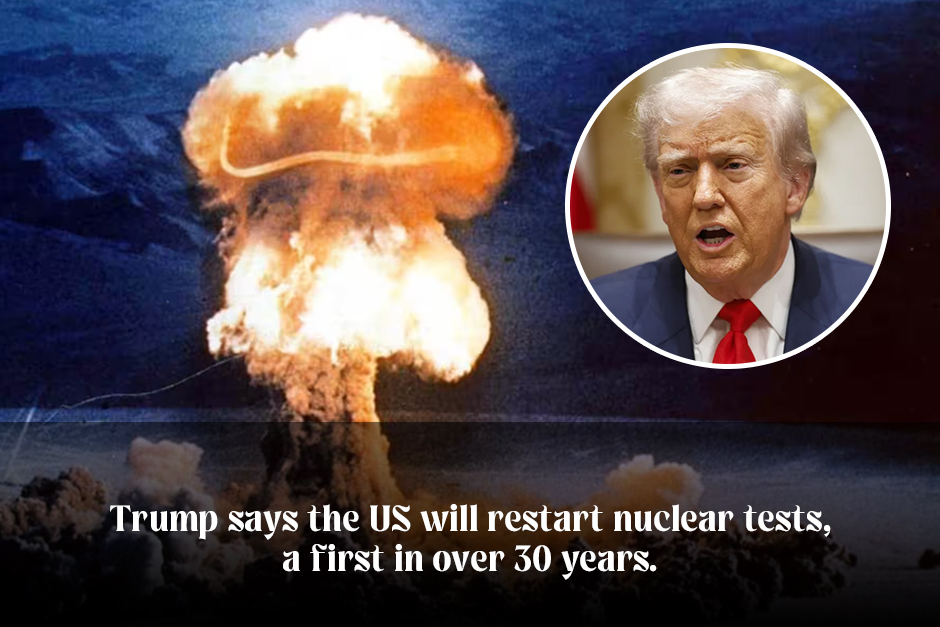The geopolitical chessboard just got a lot more interesting, and significantly more perilous, with former President Donald Trump’s recent statement suggesting the United States should restart nuclear weapons tests. This isn’t just another headline; it’s a potential seismic shift, breaking a voluntary moratorium that has held for over three decades and reshaping the very foundations of global security.
Breaking a Three-Decade Silence
For more than 30 years, the United States has observed a voluntary moratorium on nuclear weapons testing, a policy upheld by successive administrations. The last test was conducted in 1992. This long-standing restraint has been a cornerstone of global non-proliferation efforts, a signal to the world that major powers were moving away from the dangerous, visible escalation of the Cold War era. It underpinned international treaties and fostered a fragile trust that nuclear arsenals, while present, would not be openly expanded or refined through live detonations.
Trump’s suggestion to resume testing, therefore, isn’t just a technical matter. It’s a symbolic and strategic declaration that could unravel decades of diplomatic work. Restarting tests would signal a return to an era where demonstrating nuclear capabilities openly was a tool of statecraft, potentially reigniting a visible arms race that many had hoped was consigned to history. The implications for environmental safety, global health, and the very concept of nuclear deterrence are profound, raising questions about what new capabilities the US would seek to develop or validate through such tests, and why now.
The Global Ripple Effect and a New Arms Race?
The immediate and perhaps most concerning consequence of such a move would be its ripple effect on other nuclear powers and aspiring nuclear states. If the United States, a signatory to the Comprehensive Nuclear-Test-Ban Treaty (CTBT) – albeit one that has not ratified it – were to break its own moratorium, it could provide justification or impetus for other nations to follow suit. Russia and China, both modernizing their own nuclear forces, would likely view such a step as a direct challenge, potentially escalating their own testing programs or, at the very least, ratcheting up their rhetoric.
Imagine the pressure on nations like North Korea, which has already conducted multiple tests, or Iran, whose nuclear ambitions remain a flashpoint. A US return to testing could be interpreted as a green light for proliferation, undermining the very non-proliferation regime the world has struggled to maintain. As one seasoned defense analyst put it, “This isn’t just about showing resolve; it’s about potentially unraveling decades of arms control architecture, and the fallout could be truly global, making the world significantly less predictable and more dangerous.” The delicate balance of power, sustained by strategic ambiguity and mutual restraint, could quickly give way to a more overt and volatile display of destructive capability.
A Strategic Gambit or a Real Intent?
The crucial question remains: is this a genuine intention to restart testing, or a strategic gambit designed to pressure adversaries, signal resolve, or even to rally domestic support? Trump has a history of using audacious statements to shift diplomatic landscapes and redefine what is politically possible. Suggesting nuclear tests could be a way to project an image of unparalleled strength and unpredictability, aiming to compel other nuclear states to the negotiating table on his terms, or simply to show that the US is willing to consider all options.
However, the costs and risks of such a move are immense. Beyond the geopolitical fallout, there are significant practical and financial hurdles, not to mention the international condemnation that would surely follow. The very discussion, irrespective of whether tests are ever conducted, has already sent a tremor through the global community, forcing nations to consider a future where the rules of nuclear engagement are once again up for grabs. This isn’t just about testing weapons; it’s about testing the limits of international norms and the stability of a fragile peace.
Conclusion: Donald Trump’s suggestion to restart nuclear tests is far more than a passing comment; it represents a profound challenge to established international norms and a potential catalyst for a new era of global instability. Whether this remains a rhetorical tool or a blueprint for future policy, the very discussion has already sent tremors through the international community, highlighting the high stakes involved in maintaining a precarious global peace.




